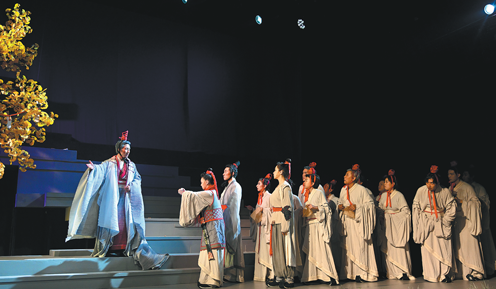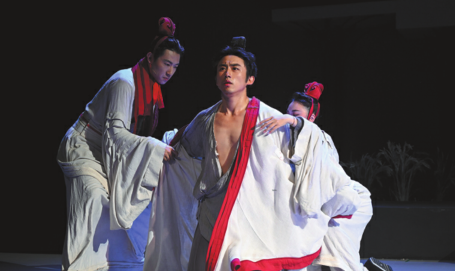Portrait of a philosopher
Seven-hour marathon explores 55 years of Confucius' life, with potential for more in the future, Chen Nan reports.

Chinese director Huang Ying first embarked on his creative journey to envision a play about classical philosopher, Confucius (551-479 BC), who has had a lasting impact on Chinese culture and is a symbol of traditional culture, in 2008. Fourteen years later, he finally completed the initial draft of the play that he titled What Are We Talking About When We Talk About Confucius?
Since its premiere in July 2023, the theatrical marathon, which is about seven hours in length, has taken audiences on an adventure. Huang is both director and co-scriptwriter and his play delves deep into historical fact and research, blending it with his own reflections on the philosopher and some tweaks to his story.
Between July 5 and 7, and again between July 12 and 14, this play is being staged in Beijing at the Pioneer Theatre, one of the theaters under the National Theatre of China.
With two intermissions, it covers only a portion of Confucius' life — from birth to his departure from the state of Lu, in modern-day Shandong province, at the age of 55.
"Chinese people grew up reading classic texts illustrating the core value and belief systems of Confucianism, even as small children. Confucius' sayings and ideas are everywhere in our daily lives, in textbooks, TV shows and movies. He seems to be someone we are familiar with," says Huang. "But as the title of the play suggests, I wanted to ask the question of what we are talking about when we talk about Confucius. It's also a question that I pose to the audience, who may have their own answers after watching the play."
The story follows the young Confucius, who was born into a poor family, as he begins his education, displaying an interest in history, poetry, music and rituals, despite facing economic hardship. He believed in the transformative power of education and the cultivation of virtue and later started teaching, emphasizing personal morality, social harmony and the importance of rituals.
Huang intervened in the story with the creation of a fictional character named Xin Mao. The young fish warden initially appears in the role of a friend of Confucius, but the pair drift apart due to the different paths their lives take. He says that Xin Mao is intended to function as a mirror, reflecting the different decisions that he and his friend make as young men.
As an adult, Confucius found employment in his home state Lu in a series of modest positions, from minor official in charge of warehouses to animal husbandry, before being appointed to the influential post of minister of crime. He eventually fell from favor as a result of his reform efforts and tried for years to reenter public service to improve it from within, but ultimately found far greater success as a teacher.
Growing frustrated with his inability to implement his ideas in government, Confucius left Lu on a journey to various other Chinese states.
In the final years of his life, his focus was on teaching his disciples, and he became a revered figure, with students coming from all over the country to learn from him.
Confucius died at the age of 73 and while he didn't write any books himself, his students ensured that his teachings, discussions, and philosophies were recorded. These compilations form the backbone of Confucian literature.
Responding to why the story of Confucius' travels through the states has yet to be told in the play, Huang says that his own exploration of the philosopher is ongoing, leaving ample room for further development.
"When I was young, studying The Analects (a collection of ideas and sayings) in excerpts at school, I always felt that I was reading timeless words, universally applicable and faultless. As I grew older, I began to appreciate the profound wisdom of Confucius more deeply. It became clear that while it was easy to recite his quotes, living by his teachings was a challenge," the director replies, when asked why he wanted to write the play to begin with.
Along with scriptwriter Zhang Ting, Huang began to explore the contexts and stages of life from which Confucius drew his insights and expressed his thoughts. They portray him as a man from a humble background with the idea of making the world a better place, inviting the audience along on his journey.
A classic guqin (a seven-stringed musical instrument) composition, Flowing Water, a vivid depiction of water flowing from high mountains, is used in the play. The composition has been adapted for the piano. Huang was inspired to use the song by the famous proverb dating back to the time of Lao Zi, shang shan ruo shui, or "the highest virtue is that of water", and he compares the qualities of water — adaptability, humility and purity — with the teachings of Confucius.
"I began to understand that his wisdom was not just a set of aphorisms, but a product of his experiences and reflections throughout life. Moreover, I couldn't ignore the influence of Confucius in my own life and in the lives of those around me," Huang says.
"His cultural legacy has been passed down through generations like an indelible mark, shaping not just beliefs and values, but also our way of thinking and behaving. His teachings continue to resonate.
"Each of us carries a part of Confucius within ourselves. This connection is why it's so important to discuss him today," Huang adds.
The director's dedication to portraying the philosopher's life and teachings underscores a profound commitment to artistic innovation.
Nevertheless, he wondered whether a seven-hour production might test limits, asking himself whether the audience would be patient enough to sit for such a long time, and if it was really necessary for the play to contain so much detailed information.
It was director Tian Qinxin, president of the National Theatre of China, who encouraged him to stick to his idea.
"I ran into Tian one day at the theater and she told me that a play about Confucius would be a new experience for the audience. She said that 'it (the seven-hour performance) may be a unique advantage of the play'," he says.
When the National Theatre of China launched the second season of its young directors support plan in Qufu, the birthplace of Confucius, in Shandong in August last year, What Are We Talking About When We Talk About Confucius? was part of the event.
"Over thousands of years, Chinese people have lived their lives with a deep respect for Confucius, whose teachings transcend time. Theater directors also have their own interpretations of Confucius, and can use their productions to communicate with the philosopher and the audience," Tian said in Qufu at the time.

































